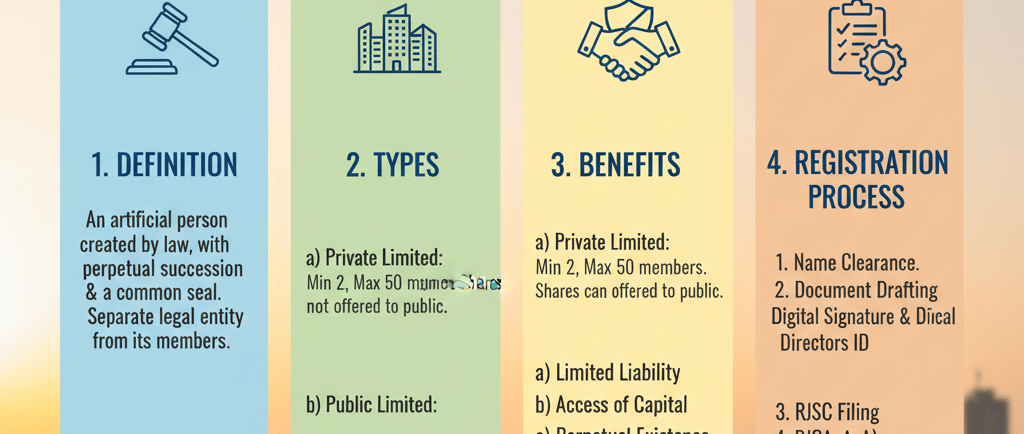An Overview of Companies: Definition, Types, Benefits, and Registration Process in Bangladesh
10/18/20252 min read


🧾 1. Definition of Company (as per Companies Act, 1994)
A company is a legal entity formed and registered under the Companies Act, 1994.
It has separate legal personality from its members.
It can own property, sue or be sued, enter contracts, and continue to exist regardless of changes in ownership.
A company’s liabilities are usually limited to its assets, protecting the personal property of shareholders (except in cases of fraud or special circumstances).
👉 Relevant Section: Section 2(1)(c) of the Companies Act, 1994 defines a company as a company formed and registered under this Act or any previous Act.
🏷️ 2. Types of Companies under Companies Act, 1994
(a) By Liability
Company Limited by Shares
Liability of members is limited to the unpaid amount (if any) on their shares.
Most common type in Bangladesh.
Company Limited by Guarantee
Members guarantee to contribute a fixed amount if the company is wound up.
Usually for non-profit or charitable organizations.
Unlimited Company
No limit on member liability.
Rare in practice.
(b) By Number of Members
Private Limited Company (Sections 2(1)(q), 27):
Minimum 2 and maximum 50 members.
Restricts share transfer.
Prohibits inviting the public to subscribe to shares.
No requirement to issue a prospectus.
Public Limited Company (Section 2(1)(r)):
Minimum 7 members, no maximum limit.
May offer shares to the public.
Can be listed on the stock exchange.
(c) By Ownership / Control (Practical classification)
Government Companies – majority ownership by Government.
Foreign Companies – incorporated abroad but have a place of business in Bangladesh.
Associations Not for Profit – registered under Section 28.
🌟 3. Benefits of Forming a Company
✅ Separate Legal Entity – the company exists independently from owners.
🛡️ Limited Liability – shareholders’ personal assets are usually protected.
💼 Perpetual Succession – the company continues despite changes in shareholders or directors.
📈 Access to Capital – easier to raise capital by issuing shares or taking loans.
🤝 Transferability of Shares – especially in public companies, shares can be transferred easily.
🏦 Credibility & Trust – registered companies enjoy more legal recognition, business opportunities, and investor confidence.
📝 4. Registration Process under Companies Act, 1994
Registration is done through the Registrar of Joint Stock Companies and Firms (RJSC).
Step 1: Name Clearance
Apply online to RJSC for name clearance.
Valid for 180 days.
Step 2: Drafting Documents
Prepare the following:
Memorandum of Association (MoA) – states objectives, scope, and powers.
Articles of Association (AoA) – internal rules and management structure.
Form I – Declaration on registration.
Form VI – Notice of the situation of registered office.
Form IX & X – Consent of directors and particulars.
Twelve copies of MoA and AoA (usually 2–3 notarized).
Step 3: Payment of Fees
Pay the registration fee and stamp duty as per the authorized capital of the company.
Step 4: Submission to RJSC
Submit all required documents to RJSC office (physically or online).
RJSC verifies the documents.
Step 5: Certificate of Incorporation
Once satisfied, RJSC issues a Certificate of Incorporation — the company legally comes into existence from this date.
👉 For a public company, additional steps like obtaining a Certificate of Commencement of Business are required after incorporation.
📌 Relevant Authority:
Registrar of Joint Stock Companies and Firms (RJSC)
👉 Website: https://www.roc.gov.bd
